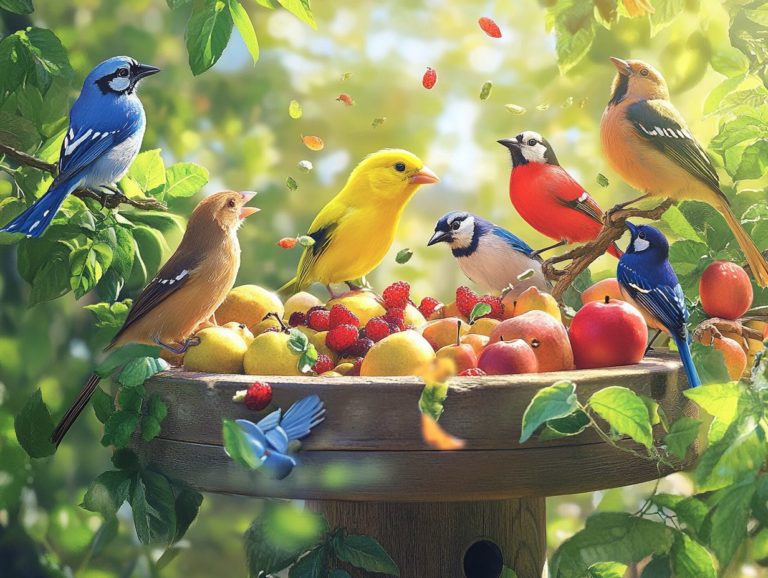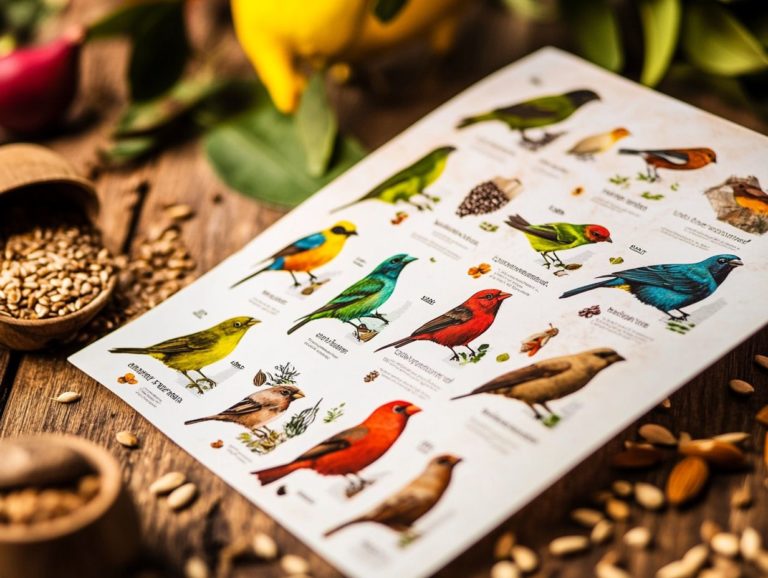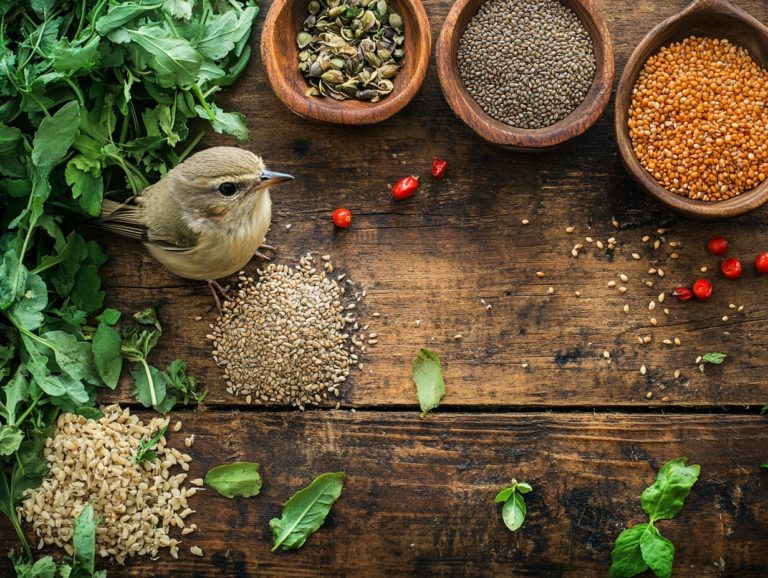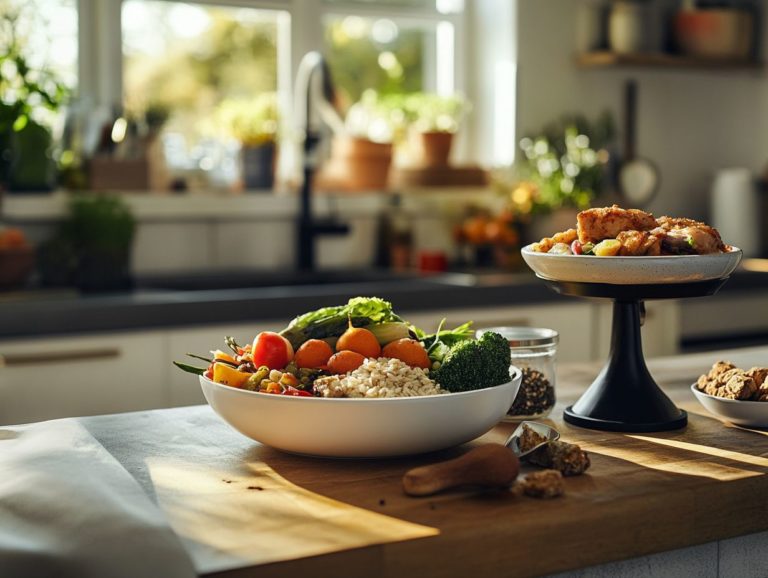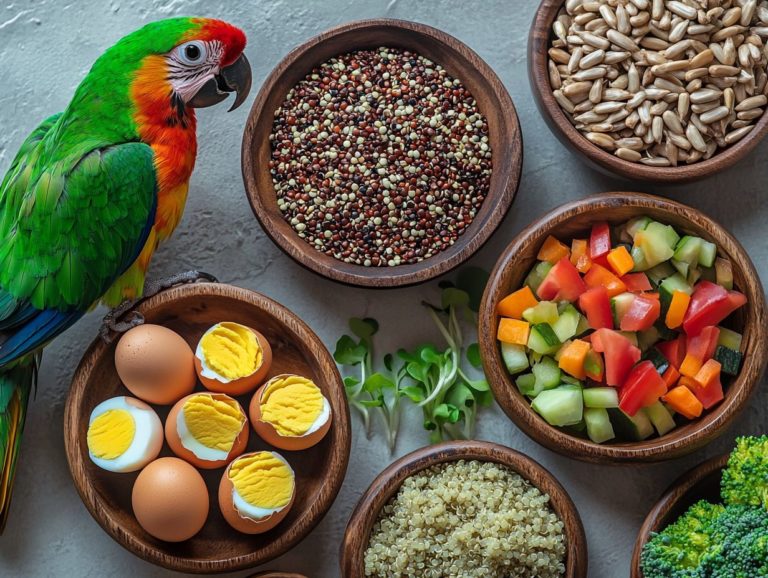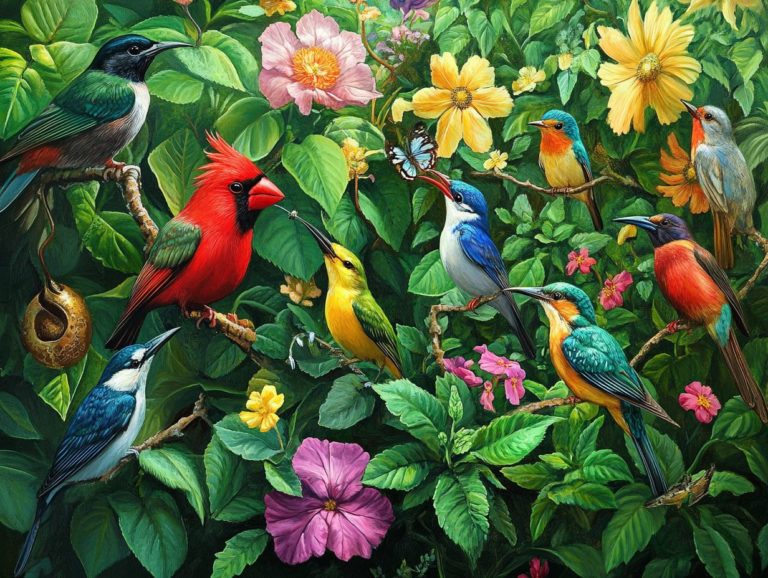Top Mistakes to Avoid When Feeding Your Bird
Feeding your bird might appear simple, yet many pet owners unwittingly commit common errors that can affect their feathered companions’ health and happiness.
Neglecting to provide a balanced diet or misjudging portion sizes can result in significant nutritional deficiencies, which is far from ideal.
To help you provide the best care possible, here are the top bird feeding mistakes to avoid when it comes to your bird’s diet.
You will find tips on safe treats, changing dietary needs with age, and more!
Contents
- Key Takeaways:
- 1. Not Providing a Balanced Diet
- 2. Overfeeding or Underfeeding
- 3. Giving Inappropriate Foods
- 4. Not Providing Enough Fresh Water
- 5. Not Considering the Bird’s Size and Species
- 6. Not Monitoring Food Intake
- 7. Giving Too Many Treats
- 8. Not Consulting a Veterinarian
- 9. Not Rotating Foods
- 10. Not Introducing New Foods Properly
- 11. Feeding from Unsafe Containers
- 12. Not Providing Enough Mental Stimulation
- 13. Using Supplements Without Consulting a Veterinarian
- 14. Not Considering Allergies or Intolerances
- 15. Not Cleaning Food and Water Dishes Regularly
- What Are the Key Nutrients a Bird Needs in Their Diet?
- Frequently Asked Questions
Key Takeaways:
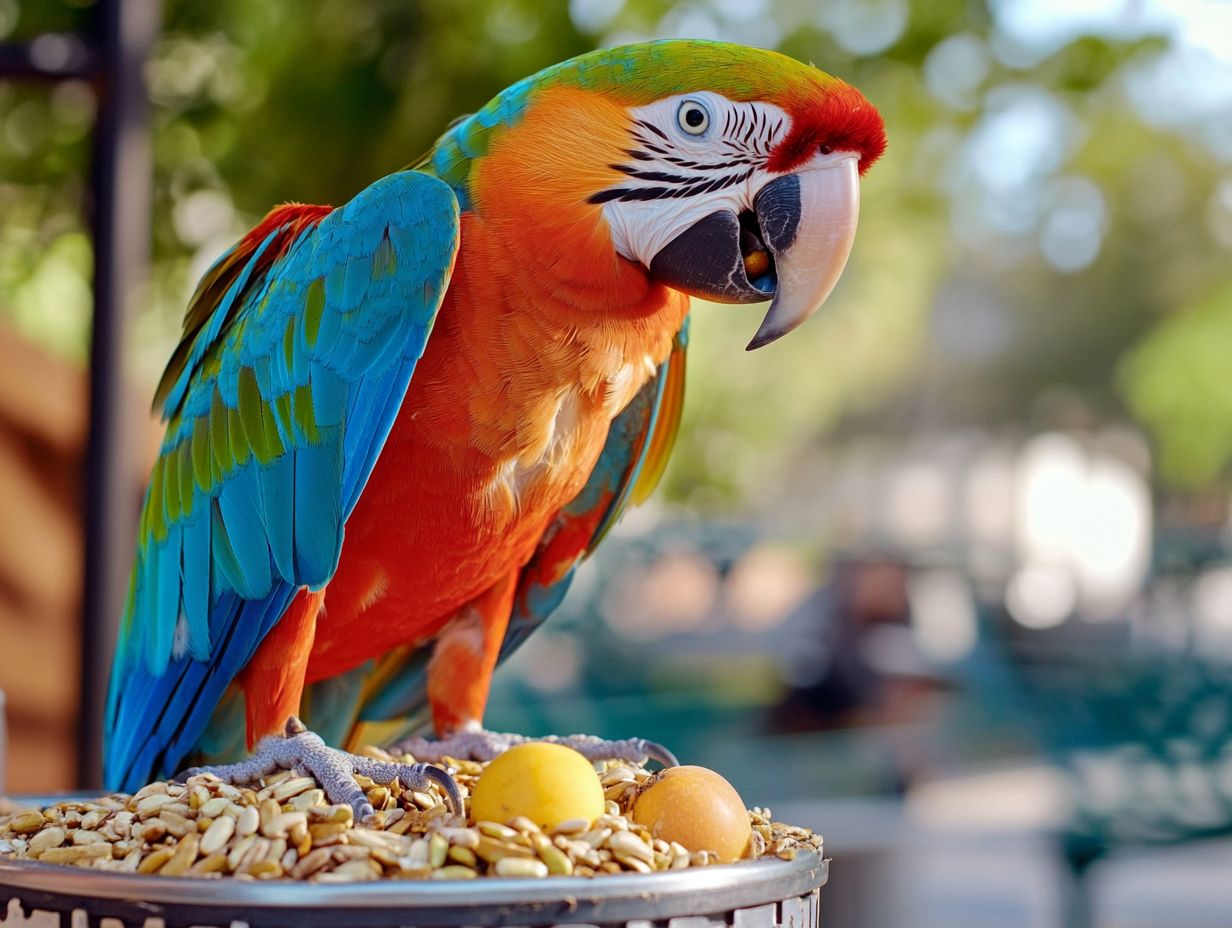
- A balanced diet is crucial for your bird’s health. Consult a veterinarian or do thorough research to ensure your bird gets all necessary nutrients.
- Overfeeding or underfeeding can lead to health problems. Monitor your bird’s food intake and adjust accordingly.
- Be mindful of your bird’s size and species when selecting foods. Not all foods are suitable for all birds.
1. Not Providing a Balanced Diet
A balanced diet is essential for nourishing the birds in your backyard. It directly influences their health, behavior, and the variety of species drawn to your feeders.
Especially during the winter months, local wildlife relies heavily on your backyard ecosystem for sustenance. By offering a range of bird food options, including high-quality seeds and protein-rich treats like suet, you cater to the nutritional needs of different bird species.
A diverse diet nurtures healthier birds and attracts visually stunning visitors, enhancing your overall birdwatching experience. Make it a habit to clean your bird feeders regularly and refresh water sources to prevent contamination, ensuring that the food remains safe and appealing.
This maintenance routine can significantly reduce the risk of disease and encourage birds to keep returning to your backyard, ultimately creating a vibrant avian community throughout the year.
2. Overfeeding or Underfeeding
Both overfeeding and underfeeding can create significant challenges for the backyard birds you cherish. These issues may lead to health issues that compromise their nutrition and overall well-being.
Establishing a consistent feeding schedule is vital for ensuring these birds receive the right amount of food tailored to their specific needs. An erratic routine disrupts their natural behaviors, leading to stress and competition among them.
Overfeeding can contribute to obesity and associated health concerns, while underfeeding may result in malnutrition and weakened immune systems. To gauge bird health, observe for signs such as steady feed consumption, vibrant plumage, and lively movements.
Regularly monitoring bird visits and their appetite can offer valuable insights into their well-being, allowing you to adjust your feeding practices as needed.
3. Giving Inappropriate Foods
Feeding birds the wrong foods, like bread or low-quality seeds, can quickly lead to health problems that your birds need to avoid! They seek nutritious options, such as sunflower seeds and suet offered in thoughtfully designed feeders.
These birds thrive on well-balanced diets that fuel their energy needs and help them maintain their vibrant plumage. By offering a diverse selection of appropriate foods, you can entice various species, from colorful finches to majestic woodpeckers.
For example, nyjer seed is particularly attractive to goldfinches, while a mix rich in peanuts and dried fruits will draw in nuthatches and chickadees. Avoid harmful foods like chocolate, avocado, and dairy products, which can lead to serious health issues.
Instead, think about providing high-quality pellets, fresh fruits, and nuts to keep the birds healthy and well-fed. What kinds of birds visit your feeders?
4. Not Providing Enough Fresh Water
Failing to provide a pristine birdbath or a reliable water source can seriously undermine your bird-feeding efforts. Birds need fresh water for drinking and bathing to maintain their health and hygiene in your backyard ecosystem.
A dependable supply of clean water supports the well-being of your feathered visitors and enhances their overall experience in your garden. When birds have access to fresh water, they re more likely to stick around, creating delightful birdwatching moments!
To keep the birdbath clean, change the water regularly aim for every few days and scrub the basin with a non-toxic cleaner. This simple step can bring in many different birds, transforming your space into a lively habitat full of colorful chirps and fluttering wings.
5. Not Considering the Bird’s Size and Species
Choosing the wrong feeders without considering the size and species of birds can lead to inefficient feeding practices. Different bird species have unique needs and preferences that greatly impact their feeding experience.
Understanding these differences is crucial for creating an inviting environment that attracts a diverse range of species. For example, smaller birds like finches prefer tube feeders with smaller perches for comfortable feeding. Meanwhile, larger species, such as cardinals, thrive in platforms or tray feeders designed for their size and feeding habits.
Placement is just as important; feeders near natural cover help birds feel secure. By offering various feeder styles and strategic placements, you can ensure that both small and large birds find suitable options. This fosters a harmonious feeding atmosphere that delights every feathered visitor.
6. Not Monitoring Food Intake
Regularly checking the food intake at your feeders is vital for maintaining healthy bird populations. This practice helps you understand feeding patterns and make necessary adjustments to your feeding grounds.
By observing the types of birds that visit and their feeding times, you can gather valuable insights into their preferences and habits. Noting changes in the number of birds throughout the day can reveal peak feeding hours. Recognizing which feeders attract the most visitors helps in strategizing food placement.
Offering diverse feeding stations like suet and nectar can draw in more wild birds, enriching the birdwatching experience for you and everyone around!
7. Giving Too Many Treats
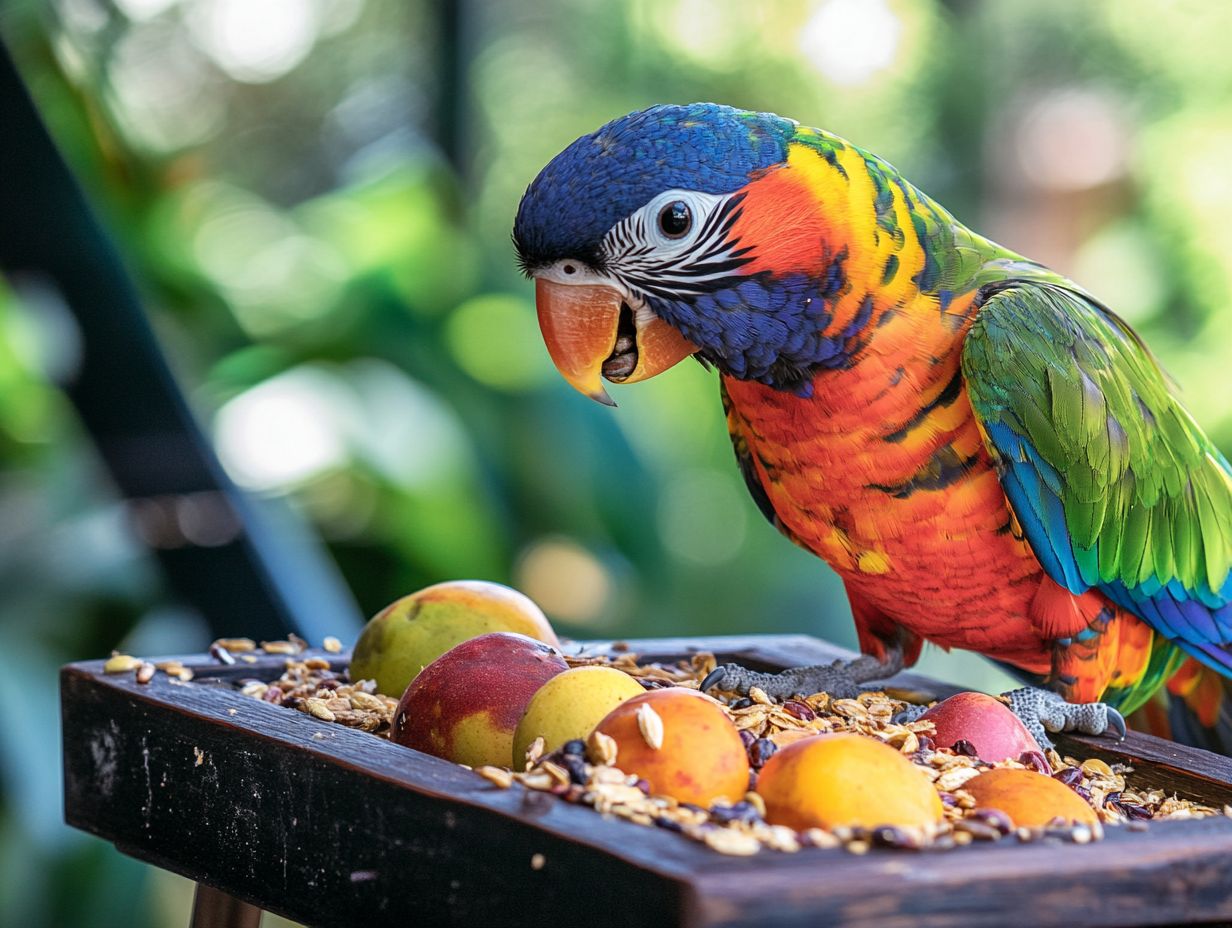
Treats can certainly add a delightful touch to your bird’s diet, but too many can disrupt their healthy diet and lead to health issues that affect their feeding habits and overall well-being.
Remember, treats should only make up a small part of their meals typically about 10 percent of their daily intake. When choosing treats, consider options like small pieces of fruits, vegetables, or specially formulated bird treats. Introducing these treats in moderation is crucial to avoid diets that are out of balance.
A well-rounded diet should primarily focus on high-quality pellets or seeds to ensure your bird receives all the essential nutrients it needs. By offering treats occasionally, you can enrich your bird’s life while maintaining its health and vitality!
8. Not Consulting a Veterinarian
Neglecting to consult a veterinarian about your bird s health and nutritional needs can lead to significant feeding problems. Specialized advice is essential to ensure that you meet the specific dietary requirements of various bird species.
These issues can surface in different forms, ranging from obesity and malnutrition to behavior challenges caused by an unbalanced diet. Seeking expert guidance helps you identify the right foods and highlights the importance of portion control and activities that keep them busy tailored to your bird s unique lifestyle.
Veterinarians can offer customized solutions that consider individual health conditions or species-specific needs, promoting optimal health and well-being. By proactively addressing these concerns, you can prevent potential health pitfalls and nurture vibrant, thriving pets that display healthier behaviors.
9. Not Rotating Foods
Not rotating your bird foods can lead to stale offerings, which might send those feathered friends packing. It s crucial to establish a feeding schedule that considers the preferences of various bird species and the freshness of the food.
A diverse diet meets the needs of different species and encourages them to explore new feeding options. By regularly updating your menu, you can create an inviting space that keeps your bird visitors curious and engaged.
To implement a successful rotation system, consider storing various types of bird food in airtight containers to maintain their freshness. Make it a habit to observe which foods attract specific birds and adjust your offerings accordingly. Keeping a calendar or log will help you track what s being served and when, ensuring that each type of food receives its fair share of attention while minimizing waste.
10. Not Introducing New Foods Properly
Introducing new foods to your backyard feeders requires a thoughtful strategy, as a hasty approach can confuse the birds and cause them to shy away from offerings that might be beneficial for their diet.
To facilitate a seamless transition, start by adding a small quantity of the new food alongside their familiar favorites. This method allows the birds to gradually adjust without feeling overwhelmed. Keep a watchful eye on their feeding behavior; if they appear hesitant or avoid the feeder altogether, it may indicate that you should slow down and give them more time with the established favorites.
Patience is essential here, as observing their reactions will provide valuable insights into which foods pique their interest. By striking a balance between known and new offerings, you create an inviting atmosphere that encourages exploration and discovery.
11. Feeding from Unsafe Containers
Act now to protect your feathered friends! Using unsafe containers for feeding birds can put their health and your backyard ecosystem at risk. It s essential to choose pest-proof feeders that prioritize both safety and cleanliness.
Certain containers, like open dishes or poorly sealed jars, can attract unwanted pests such as ants, rats, and even larger predators, threatening the delicate balance of nature in your yard. These hazards can contaminate the bird food, leading to diseases that could harm your feathered friends.
To create a healthier environment, consider investing in tube feeders made from metal or heavy-duty plastic. These options not only keep pests at bay but are also easy to clean, helping you maintain a hygienic space. Plus, feeders with built-in drainage can prevent moldy seed buildup, ensuring a safe and pleasant feeding experience for the birds.
12. Not Providing Enough Mental Stimulation
Don’t miss out on the fun! Providing enough mental stimulation makes birdwatching more exciting, as birds thrive in engaging environments that allow them to display their natural behaviors.
Consider offering a variety of feeder types like tube feeders, platform feeders, and suet cages to attract different species. This not only allows them to forage in ways that mirror their wild habits but also enhances their feeding experience.
Incorporating interactive elements, such as bird puzzles or foraging toys, encourages problem-solving and exploration. These diverse options ensure that the birds remain stimulated and entertained, benefiting their mental and physical health.
By creating a dynamic feeding environment, you can promote better health, more vibrant plumage, and a wider range of behaviors, ultimately enriching your birdwatching experience.
13. Using Supplements Without Consulting a Veterinarian
Using supplements without professional guidance can lead to unforeseen health issues in your birds. This underscores the importance of consulting a veterinarian before introducing anything new to their diet.
When supplements are used without guidance, they can create imbalances in essential nutrients. This may have serious implications for your bird s overall health.
For example, excessive calcium intake can result in kidney damage. Overdosing on vitamins might disrupt normal body processes.
It’s vital to recognize when a visit to the vet is necessary. Keep an eye out for drastic changes in behavior, unexplained weight loss, or any signs of illness.
Certain supplements, like probiotics or Omega-3 fatty acids, can indeed be beneficial when used in moderation. Consulting your veterinarian ensures that any supplements you consider are both safe and effective for your bird s unique needs.
14. Not Considering Allergies or Intolerances
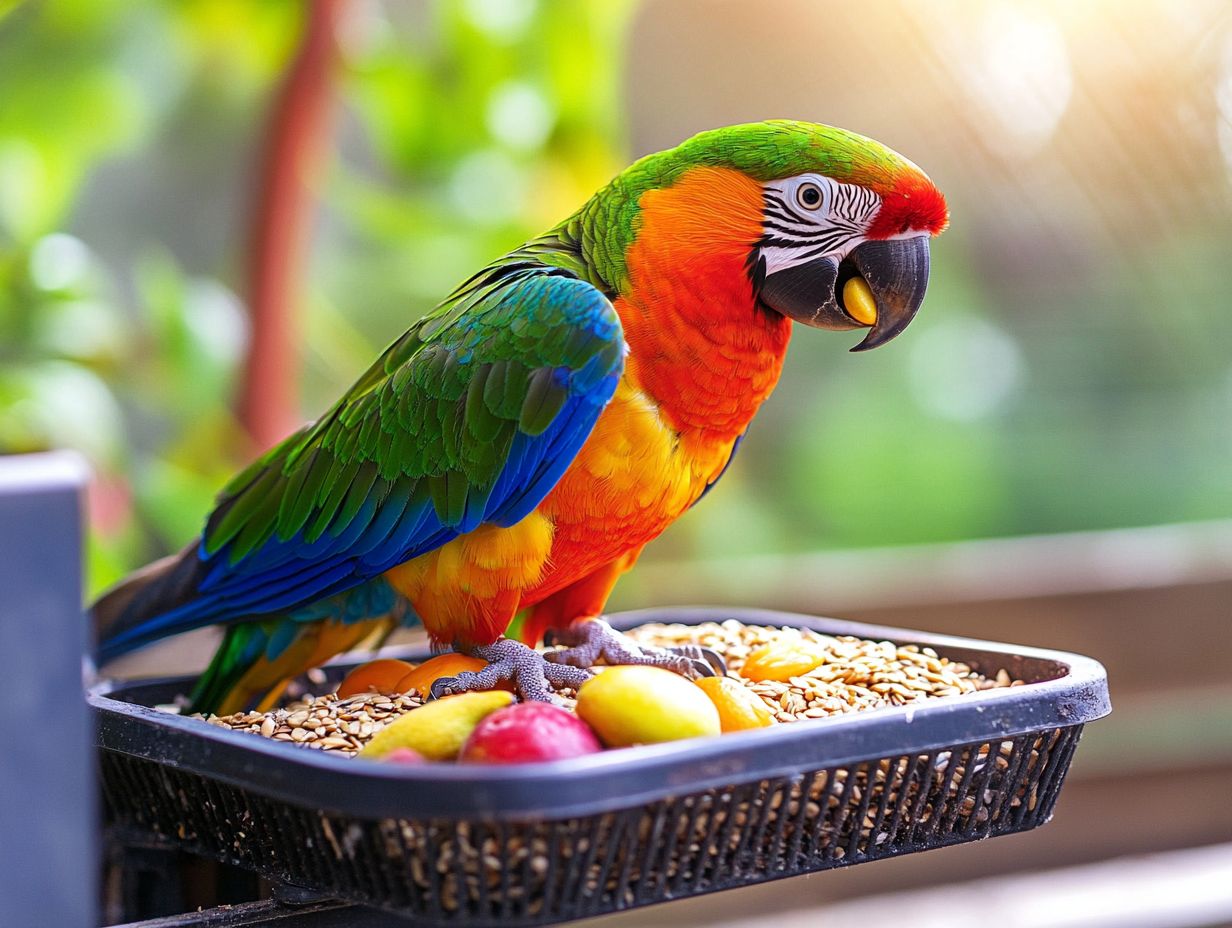
Ignoring allergies or intolerances when feeding your birds can lead to serious health issues. Understanding your bird’s specific dietary needs is crucial for their health.
Common allergies in birds often show up as skin irritations, feather plucking, or gastrointestinal problems. You might notice your feathered friend becoming less active or showing distress after eating certain foods.
Identifying specific allergens or intolerances typically involves a meticulous process of elimination in their diet. Paying attention to behavioral changes like lethargy, excessive grooming, or shifts in droppings can be key indicators.
Once you pinpoint sensitivities, it s wise to adjust your feeding practices. Providing suitable alternatives ensures a balanced diet that promotes overall well-being while steering clear of harmful ingredients.
15. Not Cleaning Food and Water Dishes Regularly
Neglecting to regularly clean the food and water dishes can pose significant health risks for birds. Contaminated environments lead to the spread of diseases and compromise their safety.
Maintaining a clean and hygienic area not only protects their well-being but also encourages more frequent visits from various species. Using safe cleaning solutions like mild soap and warm water can effectively eliminate harmful bacteria without putting the birds health at risk.
Just be sure to rinse thoroughly to remove any soap residue.
Here are some best practices to follow:
- Cleaning feeders and birdbaths at least once a week
- Ensuring they are completely dry before refilling
By incorporating these simple yet effective habits into your routine, you can create a healthier and more inviting sanctuary for your feathered friends.
What Are the Key Nutrients a Bird Needs in Their Diet?
Understanding the key nutrients that birds need in their diet is essential for your success in bird feeding. By offering a well-rounded selection of bird food, you can significantly enhance their health and cultivate a vibrant backyard ecosystem.
Birds thrive on a balanced intake of proteins, fats, and carbohydrates, all vital for supporting their energy levels and overall well-being. Proteins play a critical role in muscle development and feather production.
Fats provide a concentrated energy source, especially during those colder months. Carbohydrates deliver the quick energy birds need for their daily activities.
Different types of bird food cater to these nutritional needs; for example, sunflower seeds are packed with healthy fats and protein, making them a top choice for many species.
Suet, often derived from animal fat, offers essential calories and is particularly beneficial in winter when energy demands soar. By thoughtfully combining various food sources, you can create a nourishing environment that supports diverse bird species and fosters a thriving ecosystem right in your backyard.
Act now to ensure your feathered friends thrive!
What Are Some Safe and Healthy Treats for Birds?
Offering safe and healthy treats for birds can truly elevate their diet and entice them to return to your feeders. These treats should be both nutritionally beneficial and given in moderation.
Incorporating a delightful array of options such as unsalted nuts, sunflower seeds, and dried fruits like raisins or cranberries can significantly enhance their enjoyment and overall health. However, it s crucial to emphasize moderation; too many treats can disrupt their dietary balance.
To maintain this balance, think of these goodies as occasional rewards rather than everyday staples. Keep an eye on portion sizes. Observe how the birds react to create a joyful feeding experience that prioritizes their well-being.
How Can a Bird’s Diet Change as They Age?
As birds age, their dietary needs can change significantly. It’s crucial for you, as a birdwatcher or feeder, to adjust your offerings to support the health and behavior of older birds.
From the hatchling stage, where a high protein diet fuels rapid growth, to the exciting time of fledging, when a varied diet inspires exploration and skill development, each phase has its unique requirements. Juvenile birds often need extra calcium and vitamins as their bones and feathers develop.
Meanwhile, adult birds thrive on a balanced mix of fats and proteins for energy and reproductive health. Offer lower-calorie diets packed with nutrients to keep seniors healthy!
Once they reach their senior years, it’s essential to provide diets rich in antioxidants, which help protect against diseases and combat age-related ailments. To meet these evolving needs, you should keep a close eye on your feathered friends’ specific life stages. Offer seasonally appropriate foods that promote their longevity and overall well-being.
What Are Some Common Signs of Nutritional Deficiencies in Birds?
Act quickly! Spotting the signs of nutritional deficiencies in your birds is crucial for their health. Symptoms can vary significantly among different species and may point to underlying feeding issues.
You might notice dull or ragged feathers, changes in behavior like increased aggression or lethargy and reduced energy levels. These signs often show up as a lack of interest in play or social interaction. They can be a cry for help, indicating that something is off in their diet.
To tackle these deficiencies, consider enriching your pets diets with a balanced mix of seeds, fresh fruits, and vegetables that cater specifically to their species needs. Consulting with a veterinarian can also provide tailored dietary adjustments, ensuring their well-being is prioritized.
What Are Some Tips for Feeding Multiple Birds in One Household?
Feeding multiple birds in your backyard can be an incredibly rewarding experience. It does require some thoughtful planning and a good grasp of the different needs of various bird species to create a harmonious ecosystem.
- Start by identifying which species are frequenting your area, then tailor your feeders to suit their preferences.
- For instance, consider a platform feeder for ground-feeding birds, while tube feeders are ideal for smaller species like finches.
- Ensuring there s ample space around feeders can help prevent territorial squabbles and allow every feathered visitor to enjoy their meal peacefully.
Varying the types of food you offer is also crucial; think seed mixes for grain-eaters and suet for those insect-loving birds. Plant native shrubs and trees for essential shelter and nesting sites, fostering a thriving community among the diverse bird populations in your yard.
Frequently Asked Questions
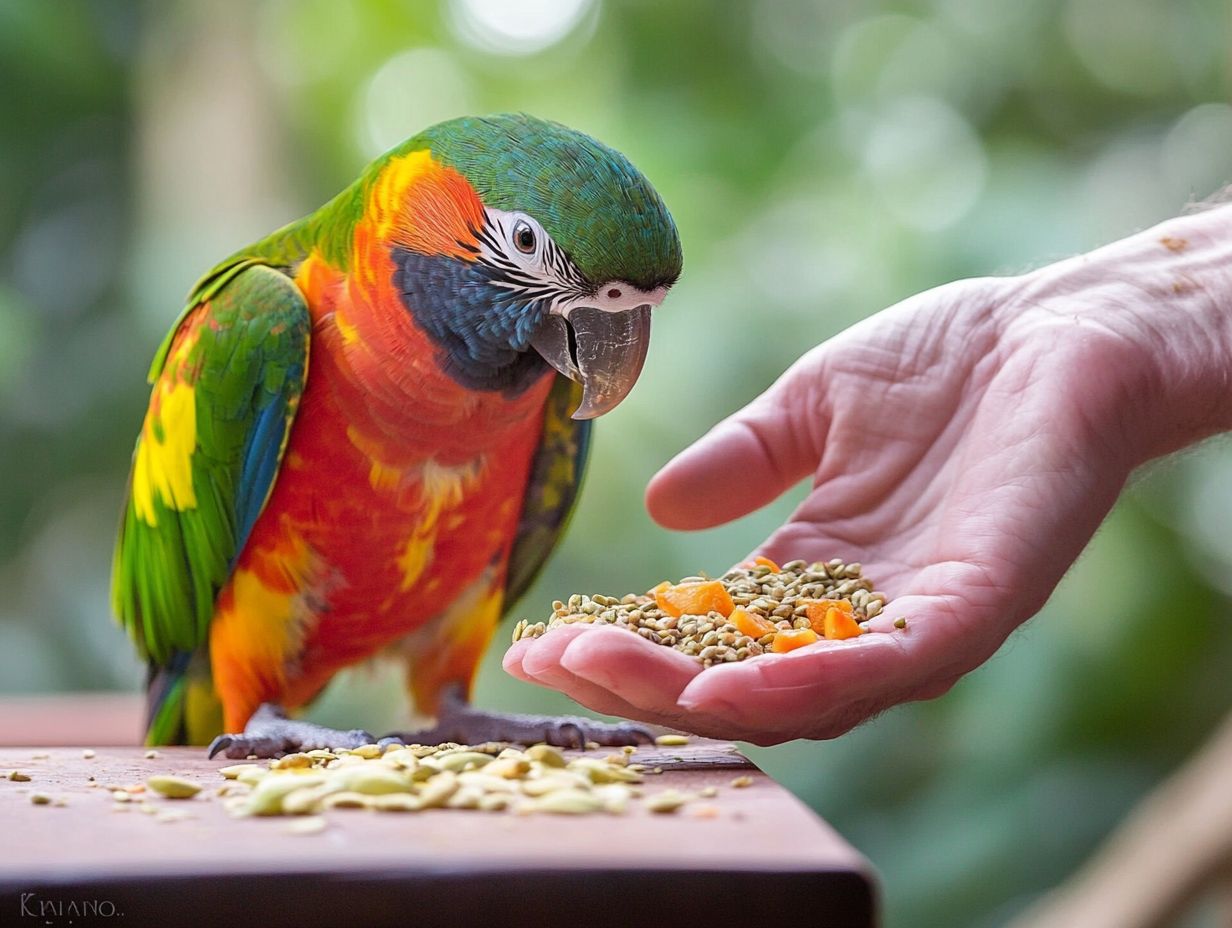
What are the top mistakes to avoid when feeding your bird?
The top mistakes to avoid when feeding your bird include giving them foods that are toxic to them, not providing a varied and balanced diet, overfeeding or underfeeding, and not properly preparing their food.
What foods should I avoid feeding my bird?
Birds are sensitive to certain foods, so you should avoid giving them avocados, chocolate, caffeine, alcohol, and anything with high levels of salt, sugar, or fat.
Why is it important to provide a varied and balanced diet for my bird?
Birds need a mix of nutrients to stay healthy. A diet consisting of only one type of food can lead to missing important nutrients and health issues.
How much should I feed my bird?
The amount of food varies based on your bird’s size, breed, and activity level. Monitor their intake closely to avoid overfeeding or underfeeding.
Can I give my bird table scraps as treats?
It s tempting to share your meal with your bird, but it s better to stick to bird-friendly treats. Table scraps are often high in fat, salt, and sugar, which can be harmful.
How should I prepare my bird’s food?
Always wash fruits and vegetables for your bird. Cook grains and legumes properly, and ensure meats are fully cooked to prevent health risks.

